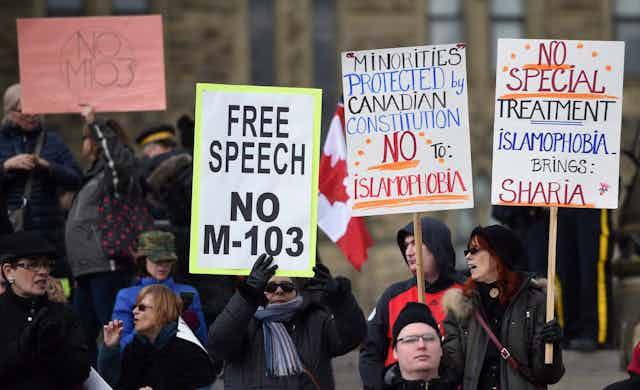“I disagree with what you say, but I will defend to the death your right to say it.”
This quote, often attributed to the 18th-century French Enlightenment philosopher Voltaire (but actually based on the paraphrasing of his work by English biographer, Evelyn Beatrice Hall), has been used as the hallmark for freedom of speech as a fundamental democratic right.
While Voltaire may not have actually uttered those words, he did say: “Tolerance has never provoked a civil war; intolerance has covered the Earth in carnage.”
Both sentiments have come into play during recent debates about free speech in two varying contexts: University classes regarding the use of gender-neutral pronouns and in the framing of the House of Commons Motion 103 combating Islamophobia.
These may seem like disparate concerns but they are in fact related in the way the so-called “alt-right” uses free speech as a rhetorical prop in their campaigns of ideological intimidation.
I am a sociology professor at Wilfrid Laurier University where faculty concerns over a teaching assistant’s decision to show a video of University of Toronto professor Jordan Peterson arguing against the use of gender-neutral pronouns has been widely publicized and critiqued.
Supporting the right of transgender people to be acknowledged outside of gender-binary language that erases their identities and experiences is branded as left-wing, bleeding heart “political correctness.” When academics opt to keep views that refuse this acknowledgement from being uncritically purveyed, it’s seen as undermining free speech rather than preserving human rights.
As an Islamophobia studies scholar, I recently testified in support of Motion 103 before a Canadian Heritage Parliamentary subcommittee. The non-binding motion condemned Islamophobia and religious discrimination in Canada. However, the longstanding right-wing contention against the motion and the term “Islamophobia” wrongly assumes the motion will deny them the freedom to criticize Islam.
As I sit at the intersection of these free speech concerns being pitted against equally important social justice issues, the tension between freedom of expression and the intolerance that Voltaire alludes to becomes clear. Sacrificing human rights on the altar of free speech has become a strategy in the “alt-right” tool kit of bigotry.
Right-wing ideologues use free speech as an alibi for their transphobic and Islamophobic rhetoric. It has become a tool for related neo-fascist groups to mount campaigns of vandalism, harassment and intimidation. On my campus, colleagues have received death threats and transgender students have been harassed.
After putting forward Motion 103, Liberal MP Iqra Khalid received 50,000 vile sexist and racist emails in one week, and hate crimes against Muslims increased 250 per cent last year.
Yet there is silence around this from the right-wing ideologues who, if they truly regard their politics as promoting the greater good, have failed to say “not in my name” to this violent “rightlash.”
By accusing social justice classrooms as being “indoctrination cults,” Jordan Peterson manages to claim innocence for his own political rhetoric while the actions of his extreme-right supporters say otherwise
As an academic, I support free speech as well as academic freedom. But these are not without limitations. Freedom of expression is limited by the consequences of that speech. Spreading hate is not free speech.
When I show videos of controversial speakers like Peterson and Anne Coulter in my classes, it is within a critical context where students can deliberate on the boundaries between free speech, hate speech and human rights in a democratic society based on social justice ideals.
Using free speech as an alibi to deny transgender people the freedom to identify themselves through the use of gender-neutral pronouns is tantamount to disregarding and dismissing their personhood.
Using free speech as an alibi to deny Muslims the freedom to name their oppression when members of their faith were gunned down while praying adds insult to grave injury.
Our freedoms only extend to the point where they do not infringe on the freedom of others. Promoting free speech as a democratic ideal without respecting its limits and taking responsibility for its consequences is antithetical to the greater good of a just and inclusive society.

